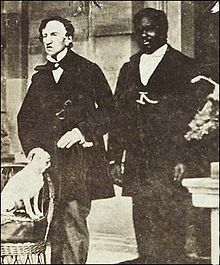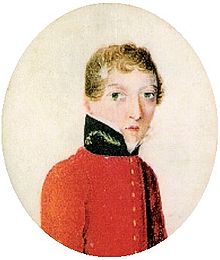- James Barry (surgeon)
-
James Barry (c. 1789-1799 – 25 July 1865), was a military surgeon in the British Army. After graduation from the University of Edinburgh, Barry served in India and Cape Town, South Africa. By the end of his career, he had risen to the rank of Inspector General in charge of military hospitals. In his travels he not only improved conditions for wounded soldiers, but also the conditions of the native inhabitants. Among his accomplishments was the first caesarean section in Africa by a British surgeon in which both the mother and child survived the operation.[1]
Although Barry lived his adult life as a man, it is widely believed that he was female assigned at birth and named Margaret Ann Bulkley[2] and that he chose to live as a man so that he might be accepted as a university student and be able to pursue his chosen career as a surgeon.[1] Thus Barry would be the first female assigned at birth Briton to become a qualified medical doctor.[3] It has also been theorized that Barry was intersex.[4]
Contents
Biography
Early life
Information about Barry's early life has been rife with myth and speculation; with no contemporary records known. The exact date of Barry's birth is uncertain; with sources putting the date at 1789,[3] 1792,[4][5] 1795,[6], or 1799.[7]
Evidence collected by Hercules Michael du Preez indicates that Barry was born Margaret Ann Bulkley in Ireland in 1789, the second child of Jeremiah and Mary-Ann Bulkley.[3] The child's mother was the sister of James Barry, a celebrated Irish artist and professor of painting at London's Royal Academy. However, family financial mismanagement left Mary-Ann and Margaret Bulkley without the support of either Jeremiah Bulkley (in prison) or their son John (married).[3] Letters during this time of financial hardship refer to a conspiracy between Mrs. Bulkley and some of her brother's influential, liberal-minded friends to get the teenager – then still known as Bulkley's daughter Margaret – into medical school.[3] A financial record from the family solicitor indicates that Mary-Ann and Margaret Bulkley travelled to Edinburgh by sea at the end of November 1809.[3] A letter to the same solicitor, sent on 14 December, in which 'James Barry' asks for any letters for him to be forwarded to Mrs. Bulkley, mentions that '...it was very usefull [sic] for Mrs. Bulkley (my aunt) to have a Gentleman to take care of her on Board Ship and to have one in a strange country...', apparently indicating that the younger traveller had assumed this male identity upon embarking on the voyage. Although the letter was signed by Barry, the solicitor wrote on the back of the envelope 'Miss Bulkley, 14 December'.[3]
Education
Following his 1809 arrival in Edinburgh, Barry began studies at the University of Edinburgh as a 'literary and medical student'. He qualified with a Medical Doctorate in 1812, then moved back to London. There he signed up for the Autumn Course 1812/1813 as a pupil of the United Hospitals of Guy’s and St Thomas'.[3] On 2 July 1813, Barry successfully took the examination for the Royal College of Surgeons of England, subsequently qualifying as a Regimental Assistant.[3]
Career
Barry was commissioned as a Hospital Assistant with the British Army on 6 July 1813, taking up posts in Chelsea and then the Royal Military Hospital in Plymouth, where he was promoted to Assistant Staff Surgeon.[3] He might have served in the Battle of Waterloo (18 June 1815)[citation needed]. After that he served in India and then in South Africa. He arrived in Cape Town between 1815 and 1817.
In a couple of weeks he became the Medical Inspector for the colony. During his stay, he arranged for a better water system for Cape Town and performed one of the first known successful Caesarean sections - the boy was christened James Barry Munnik. He also gained enemies by criticizing local handling of medical matters. He left Cape Town in 1828.
Barry's next postings included Mauritius in 1828, Trinidad and Tobago, and the island of Saint Helena. In Saint Helena he got into trouble for leaving for England unannounced. Later he served in Malta, Corfu, the Crimea, Jamaica, and in 1831 Canada.
By this time he had reached the rank of Inspector General, H.M. Army Hospitals. However, during his next posting in Saint Helena, he got into trouble with the internal politics of the island, was arrested and sent home, and demoted to Staff Surgeon. His next posting was the West Indies in 1838.
In the West Indies Barry concentrated on medicine, management and improving the conditions of the troops. He was promoted to Principal Medical Officer. In 1845, Barry contracted yellow fever and left for England for sick leave in October.
Barry was posted to Malta on 2 November 1846. Within a month of his arrival he took a seat in the local church that was reserved for the clergy and was severely reprimanded. During his stay he had to deal with a threat of a cholera epidemic, which eventually broke out in 1850. He left Malta for Corfu in 1851 with the rank of Deputy Inspector-General of Hospitals. He left Corfu in 1857 for Canada as an Inspector-General of Hospitals. In that position, he fought for better food, sanitation and proper medical care for prisoners and lepers, as well as soldiers and their families.
End of life
James Barry retired in 1864 — reputedly against his wishes — and returned to England. He died from dysentery on 25 July 1865. Sophia Bishop, the charwoman who took care of the body, discovered his female anatomy and revealed this information after the funeral. Afterward many people claimed to have "known it all along". The British Army sealed all records for 100 years.[1] Historian Isobel Rae gained access to the army records in the 1950s, and concluded that Barry was a niece of James Barry the painter.[8] He was buried in Kensal Green Cemetery under the name James Barry and his full rank. His manservant John subsequently returned to Jamaica.
Character
Barry was not always a pleasant fellow to be around. He could be tactless, impatient, argumentative and opinionated. He reputedly fought a couple of duels when someone commented on his voice, features, or professionalism. He was punished many times for insubordination and discourteous behaviour but often received lenient sentences. During the Crimean War (1854–1856), he got into an argument with Florence Nightingale.[7]
He appears to have had a good bedside manner and professional skill.[7] He tried to improve sanitary conditions wherever he went and improve the conditions and diet of the common soldier, by introducing the pear. He reacted indignantly to unnecessary suffering. His insistence to better conditions of poor and commoners annoyed his peers. He was a vegetarian and teetotaler and reputedly recommended wine baths for some patients. His manservant (named John) and his dogs were his constant companions.
In popular culture
Dutch filmmaker Marleen Gorris has begun work on a film based on Barry's life, entitled Heaven and Earth,[8][9]. Set in 1825 in the Cape, the film tells of a secret love affair between Barry (played by Natascha McElhone) and Lord Charles Somerset (James Purefoy).
The character of Barry has been played by Anna Massey in an episode of the BBC drama-documentary A Skirt Through History.[10]
His life is the subject of the historical novel James Miranda Barry (published in the USA as The Doctor) by Patricia Duncker.
The Canadian aspect of Barry's career was dramatised in an episode of the series Heritage Television, produced by then-independent superchannel CHCH in Hamilton, and hosted by Canadian historian Pierre Berton.
A 2004 play, Whistling Psyche by Sebastian Barry, imagines a meeting between James Barry and Florence Nightingale.[11]
References
- ^ a b c Pain, Stephanie (2008-03-06). "The 'male' military surgeon who wasn't". NewScientist.com. http://www.newscientist.com/article/mg19726462.000-histories-the-male-military-surgeon-who-wasnt.html. Retrieved 2008-03-16.
- ^ "Five British heroes overlooked by history". BBC News. 2009-11-17. http://news.bbc.co.uk/1/hi/magazine/8364465.stm#margaret. Retrieved 2010-05-05.
- ^ a b c d e f g h i j Hercules Michael du Preez (2008-01-14). "Dr James Barry: The early years revealed". South African Medical Journal, Vol 98, No 4 (2008). South African Medical Journal. http://www.samj.org.za/index.php/samj/article/viewFile/130/425. Retrieved 2008-04-03.
- ^ a b Kubba, A. K (2001). "The Life, Work and Gender of Dr James Barry MD" (PDF). Proc R Coll Physicians Edinb 31 (4): 352–356. PMID 11833588. Archived from the original on 2007-09-28. http://web.archive.org/web/20070928004833/http://www.rcpe.ac.uk/publications/articles/vol31_no4/R_The_Life.pdf. Retrieved 2007-12-15.
- ^ Leitch, Robert (2001-07-01). "The Barry Room: The Tale Of A Pioneering Military Surgeon". usmedicine.com. Archived from the original on 2007-09-28. http://web.archive.org/web/20070928030206/http://www.usmedicine.com/column.cfm?columnID=53&issueID=28. Retrieved 2007-12-14.
- ^ "James Barry Biography". Dictionary of Canadian Biography. http://www.biographi.ca/009004-119.01-e.php?&id_nbr=4283. Retrieved 2007-12-23.
- ^ a b c [1] Oxford Dictionary of National Biography : "Barry, James (c.1799–1865)."
- ^ a b Maguire, Stephen (30 December 2008). "She's a beauty ... and just perfect to play the role of the most". Sunday Mirror. http://findarticles.com/p/articles/mi_qn4161/is_20080928/ai_n28113596.
- ^ Heaven and Earth at the Internet Movie Database
- ^ "A Skirt Through History: An Experiment". BFI Film & TV Database. British Film Institute. http://ftvdb.bfi.org.uk/sift/title/509439. Retrieved 2008-06-19.
- ^ Lopaz, Andrea. Review of Whistling Psyche. CurtainUp, 2004.
Further reading
- Beukes, Lauren: Maverick:Extraordinary Women From South Africa's Past, ISBN 0-177-00705-0
- Brandon, Sydney: ‘Barry, James (c.1799–1865)’, Oxford Dictionary of National Biography, Oxford University Press, Sept 2004; online edn, Jan 2008 accessed 4 Aug 2008; ODNB in notes.
- Duncker, Patricia: James Miranda Barry (historical fiction), ISBN 0-330-37169-X
- Duncker, Patricia: The Doctor, ISBN 0-006-00904-1
- Holmes, Rachel: Scanty Particulars: The Scandalous Life and Astonishing Secret of James Barry, Queen Victoria's Most Eminent Military Doctor ISBN 0-375-5055-6
- Kronenfeld, Anne and Ivan: The Secret Life of Dr. James Miranda Barry (historical fiction) ISBN 3-978-15943109
- Racster, Olga: Dr. James Barry: Her secret story
- Rae, Isobel: The Strange Story of Dr. James Barry: Army Surgeon, Inspector-General of Hospitals, Discovered on Death to be a Woman
- Robb, Colin Johnston: The Woman Who Won Fame in the British Army as a Man (article published in The Northern Whig and Belfast Post, Friday, November 16, 1846)
- Rose, June: The Perfect Gentleman ISBN 0-00912684-0
- Town, Florida Ann: With a Silent Companion (historical fiction for ages 12–16), ISBN 0-88995-211
External links
- The Mysterious Doctor James Barry by Van Hunks
- Dr. Barry's Doctoral Thesis (in Latin and English)
- Dr. Barry's Burial Site
- The Cape Doctor in the Nineteenth Century: A Social History - by Helen Sweet (December 2005) in the journal The Social History of Medicine, (citation: Soc Hist Med. 2005; 18: 504-506)
- Home Taught for Abroad: The Training of the Cape Doctor, 1807-1910 by Howard Phillips, in the Wellcome Series in the History of Medicine
- Copley, Hamish. "Dr. James Miranda Barry." The Drummer's Revenge: LGBT history and politics in Canada. December 2, 2007.
Categories:- Duellists
- English surgeons
- English vegetarians
- LGBT people from England
- Royal Army Medical Corps officers
- 1790s births
- 1865 deaths
- Transgender and transsexual physicians
- Transgender and transsexual soldiers
Wikimedia Foundation. 2010.


